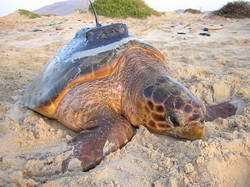Not Only People Get Wireless, Turtles Too

Ground-breaking work to investigate the migratory movements of marine turtles in the UK Overseas Territories began on the Caribbean “Emerald Isle” of Montserrat this week. Staff from Government of Montserrat (GoM) attached a satellite transmitter to “Montserrat”, a 150kg green turtle, which will enable her migratory movements to be logged from space and followed live on the internet at seaturtle.org/tracking/ Since leaving Montserrat’s shores she has already passed through the waters of St Kitts and Nevis but where will she stop?
The satellite tracking is part of a 2-year UK Government funded OTEP project spearheaded by staff from the University of Exeter in Cornwall’s, Marine Turtle Research Group in association with the UK’s Marine Conservation Society. The project involves a coalition of organisations in Anguilla, Ascension Island, British Indian Ocean Territory, British Virgin Islands, Cayman Islands, Montserrat and the Turks and Caicos Islands and aims to continue to build upon existing capacity for management of marine turtles and their habitats. In tandem with these efforts, extensive awareness raising activities will be undertaken. The project is given IT backup by the online US based NGO SEATURTLE.ORG
“We have been working for over 20 years to find out about the turtles nesting on our shores but this is the first time we have been able to gain insights as to where turtles nesting in Montserrat might live. It is most exciting.” said Mr. John Jeffers of Montserrat’s Department of Fisheries and long term co-ordinator of the sea turtle monitoring project.
“Through this project we will start to chip away at some of the great unknowns in the biology of marine turtles in each of the UK Overseas Territories but, perhaps more importantly, we hope to raise awareness as to how, given their migratory nature, regional approaches to their conservation must be taken” said Dr Brendan Godley of the Marine Turtle Research Group. “In addition, in global terms the vast majority of the biodiversity of the UK and its Territories is contained within the small and relatively under-resourced islands such as Montserrat. We hope to highlight this importance both to attract further conservation funding and lend support to the burgeoning ecotourism sector. Nature tourism holds tremendous potential as part of a stronger economic future in Montserrat as the island begin to return to normal following the cessation of volcanic eruptions.”
“The nesting turtle populations in Montserrat and the other UK Overseas Territories in the Caribbean are critically small following hundreds of years of harvest, and finding out which nations share responsibility of nesting populations is a great start towards an integrated conservation strategy. ” said Peter Richardson, Species Policy Officer with MCS. “We hope that the public both in Montserrat and further afield will log on to the tracking pages and we look forward to announcing the deployment of additional transmitters in Anguilla, the British Virgin Islands, Cayman and Turks and Caicos Islands over the next year ”















